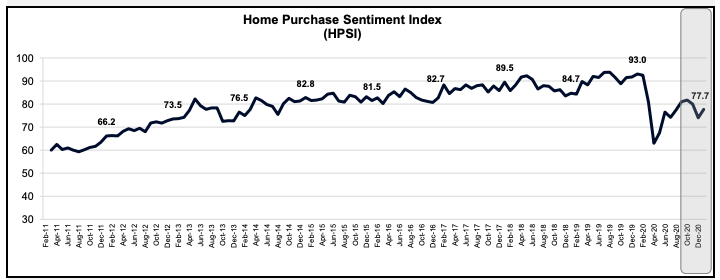Consumers expressed more positive sentiments toward the housing market as 2021 arrived, sending Fannie Mae's Home Purchase Sentiment Index (HPSI) a bit higher. The most significant gains came from increased optimism about the climate for selling a home.
The index increased by 3.7 points to 77.7 in January, erasing at least a portion of its 6-point loss in December. Fifty-seven percent of consumers contacted by the monthly National Housing Survey said they felt it was a good time to sell a home, up 7 points from December, while those who viewed it as a bad time dropped 9 points to 33 percent. This left the net positive answers at 24 percent, a 16-point month-over-month increase and 21 points higher than in January of last year.

Positive feelings about buying a home were unchanged from December at 52 percent, but negative responses dipped from 39 to 37 percent, moving the net positives up 2 points to 15 percent. This, however, is 14 points below the level in January 2020.
"The HPSI experienced a modest uptick in January, reversing much of December's decline," said Doug Duncan, Fannie Mae Senior Vice President and Chief Economist. "Interestingly, lower-income and renter groups were more optimistic this past month across nearly all of the sentiment index's components. We will pay close attention to see if this newfound optimism develops into a trend, which could indicate either that some demographics who have been more negatively impacted by the pandemic may be starting to feel the economic recovery or that this is a response to the additional stimulus enacted in December."
"Overall, the index's monthly increase was driven largely by a substantial jump in the share of consumers reporting that it's a good time to sell a home, with many citing favorable mortgage rates, high home prices, and low housing inventory as their primary rationale. Among owners and higher income groups, however, the other five components of the index remained relatively flat or slightly negative, suggesting to us that some consumers are waiting to gauge the effectiveness of any new fiscal policies and vaccination distribution programs on both housing and the larger economy."
The percentage of respondents who say home prices will go up in the next 12 months was unchanged at 41 percent while those who expect a price decline grew from 16 percent to 17 percent. Thirty-four percent expect no change in prices, identical to the result in December. Thus, the net share of Americans who say home prices will go up decreased 1 percentage point month-over-month and is 17 percent below year-ago levels.
The percentage of respondents who expect mortgage rates will decline over the next 12 months moved 1 point higher to 9 percent while 45 percent say rates will increase, 2 points more than the prior month. Those who expect no change declined from 39 to 37 percent. This left the net at a negative 36 percent compared to a negative 26 percent the previous January.
The percentage of respondents who say they are not concerned about losing their job in the next 12 months remained unchanged at 75 percent and the net who said they were not concerned increased 1 point to 51 percent. That is down 21 points year-over-year.
The share of respondents reporting significantly higher household income over the past year increased from 20 to 21 percent while reports of significant declines were down 4 points to 14 percent. Little change was reported by two-thirds of respondents. The net share of those who say their household income is significantly higher than it was 12 months ago increased 5 percentage points month-over-month but was down 9 points on an annual basis.
The National Housing Survey from which the HPSI is constructed, is conducted monthly by telephone among 1,000 consumers, both homeowners and renters. In addition to the six questions that are the framework of the index, respondents are asked questions about the economy, personal finances, attitudes about getting a mortgage, and questions to track attitudinal shifts.







